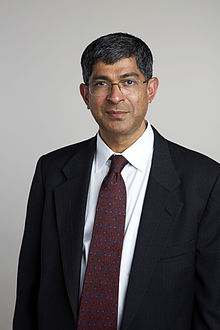John Kuriyan
John Kuriyan | |
|---|---|
 John Kuriyan in 2015, portrait via the Royal Society | |
| Alma mater |
|
| Awards |
|
| Scientific career | |
| Institutions | University of California, Berkeley |
| Thesis | The structure and flexibility of myoglobin : molecular dynamics and x-ray crystallography (1986) |
| Doctoral advisor | |
| Website | |
John Kuriyan is Chancellor's Professor at the University of California, Berkeley in the departments of Molecular and Cell Biology (MCB) and Chemistry. He is also a Faculty Scientist in Berkeley Lab's Physical Biosciences Division, a Howard Hughes Medical Institute investigator, and a member of the National Academy of Sciences.[1][3]
Education
Kuriyan received his B.S. in chemistry from Juniata College in Pennsylvania, followed by his PhD at the Massachusetts Institute of Technology supervised by Gregory Petsko and Martin Karplus. [citation needed]
Research and career
Kuriyan did postdoctoral research work for one year supervised by Karplus at Harvard before becoming an assistant professor at the Rockefeller University. As of 2015[update] Kuriyan's laboratory studies the structure and mechanism of enzymes and other proteins that transduce cellular signals and perform DNA replication. The laboratory primarily uses x-ray crystallography to determine 3-D protein structures as well as biochemical, biophysical, and computational techniques to uncover the mechanisms used by these proteins.
Awards and honors

In 1989, Kuriyan was named a Pew Scholar in the Biomedical Sciences, a program supporting promising young researchers in the areas of basic and clinical sciences relevant to human health advancements. Kuriyan was the recipient of the 2005 Loundsbery Award by the National Academy of Sciences, a recognition presented annually to a single scientific investigator, under the age of 45, who has made significant contributions to medicine or biology. Additional awards include the Cornelius Rhoads Memorial Award from the American Association for Cancer Research (1999), the Eli Lilly Award in Biological Chemistry of the American Chemical Society (1998), the Dupont-Merck Award of the Protein Society (1997), and the Schering-Plough Award of the American Society for Biochemistry and Molecular Biology (1994). In 2009 he received the ASBMB Merck award for his contributions to structural biology. Kuriyan was elected a Foreign Member of the Royal Society (ForMemRS) in 2015.[2]
References
- Living people
- American molecular biologists
- University of California, Berkeley College of Chemistry faculty
- Harvard University people
- Howard Hughes Medical Investigators
- Members of the United States National Academy of Sciences
- Crystallographers
- American biochemists
- Foreign Members of the Royal Society
- American biochemist stubs
